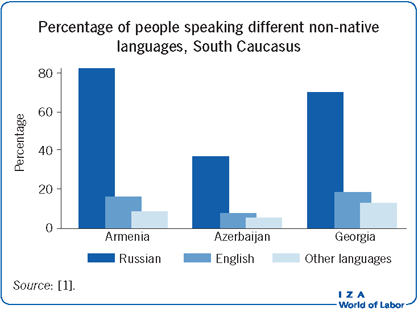Elevator pitch
In many transition countries, the collapse of communism ushered in language reforms to adapt to the newfound independence from the Soviet Union and openness to the rest of the world. Such reforms may have implications for individuals’ economic opportunities, since foreign language proficiency may enhance or signal productivity in the labor market. Recent empirical evidence documents positive labor market returns to English language skills in transition countries. However, Russian language proficiency also remains economically valuable, and nationalist language policies may lead to future loss of economic opportunities.
Key findings
Pros
English language proficiency is in high demand in transition countries.
Russian language skills remain an important form of human capital in the former Soviet Union and are well rewarded in those labor markets.
There are apparent labor market returns to language proficiency in jobs where communication is important and tasks are complex.
Language is likely to be complementary to other forms of human capital; for example, high-skilled men gain more from language proficiency than men with low levels of skills.
Cons
There are gender differences in the labor market returns to language proficiency in some transition countries.
Nationalist language policies can hurt the outcomes of minorities in multilingual societies.
Language skills may yield negative labor market premiums, particularly if there are differences in the quality of education offered in different languages.
It is difficult to separate the effect of language from that of other less observable characteristics, such as innate ability.
